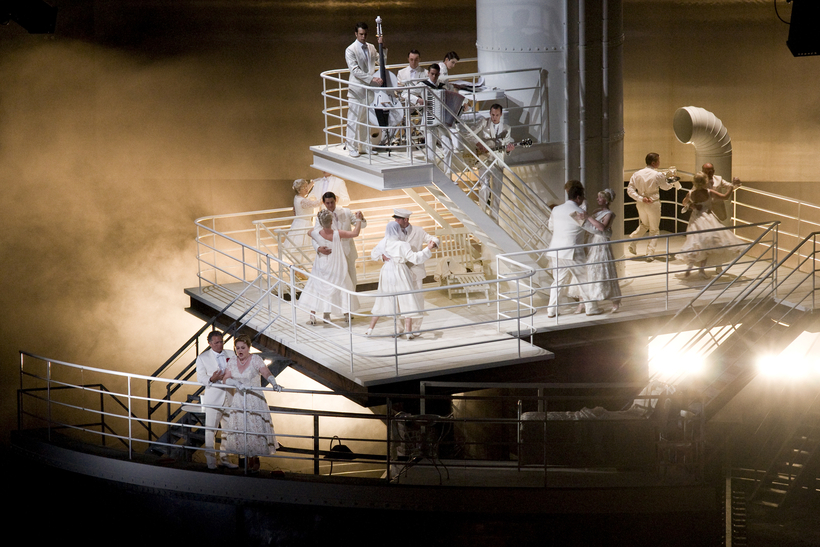Walter Kretschmer, a German diplomat, and Lisa, his wife, are waltzing the night away, giddy as honeymooners, as the ship sails onward to his new posting in Brazil. Then, suddenly, panic. That stranger! Isn’t she Martha, the young Polish Catholic whom Lisa sent to certain death in Auschwitz? “The war was a long time ago,” Walter reassures Lisa, sickened to discover her secret past as a camp official but mainly thinking of his career. “Everyone has a right to forget the war. Time erases everything.” Oh? In truth, who remembers what and how is no simple question.
The phenomenally talented, perennially unlucky, Polish-born composer Mieczysław Weinberg (1919–1996) regarded his first opera The Passenger, completed in 1968, as his masterpiece. Yet it was never staged until the Bregenz Festival of 2010, in Austria, 14 years after Weinberg’s death. Another 14 years later, the live video captured on July 31 of that summer remains a revelation.

The Passenger was based on a novel by the Polish resistance fighter and Auschwitz survivor Zofia Posmysz. Weinberg learned of it from his friend and champion Dmitri Shostakovich, who was understandably blown away when he saw Weinberg’s score. Both composers were wicked mimics, capable of stitching pandemonium, aching lyricism, catchy dance tunes, and folk melodies that hark back to the dawn of time into hypnotic theatrical pastiche by turns sardonic and heart-on-sleeve. Weinberg’s sharp orchestral details offer pointed running commentary on the drama; his climactic appropriation of J. S. Bach’s in every way tremendous Chaconne from the Violin Partita in D minor, BWV 1004, is a musical and theatrical stroke of genius. Reviewing the premiere in The New Yorker, Alex Ross noted that he had long thought of Weinberg as a Shostakovich imitator (Ross’s word was “epigone”) but was now realizing that the influence often ran the other way.
In Bregenz, David Pountney delivered a model production that has since traveled as far afield as Houston and Madrid. It was sung not in the original Russian but in the many languages of the multinational cast of characters—an excellent idea, and the division of the stage into well-lit upper levels for the ship and the floor for dark flashbacks to Auschwitz was another.

On the video, Michelle Breedt captures Lisa’s creepy need to please even the prisoners whose lives are in her hands—in striking contrast to Elena Kelessidi as Lisa’s chosen pet Martha, the “Madonna of the camp” who refuses to be taken in by Lisa’s very tempting favors. Martha’s sister prisoners make up a gallery of vividly individual personalities, each memorably etched and excellently sung. If their solidarity and mutual tenderness seem romanticized, the stark contrast with the brutality of the Nazi thugs, technocrats, and toadies serves the composer’s purpose.
The conductor Teodor Currentzis, who has since emerged as a box-office attraction and lightning rod for artistic and political controversy, has all Weinberg’s complexities at his fingertips. The Vienna Symphony Orchestra and the Prague Philharmonic Choir come through for him in spades. For a theatrically trickier but emotionally equally keen spin on the material, check out the production from the Graz Opera, staged in 2021 by Nadja Loschky and conducted by Roland Kluttig.
The Bregenz Festival’s production of The Passenger is available for streaming on the Naxos Video Library, which also offers the Graz opera production
Matthew Gurewitsch writes about opera and classical music for AIR MAIL. He lives in Hawaii

